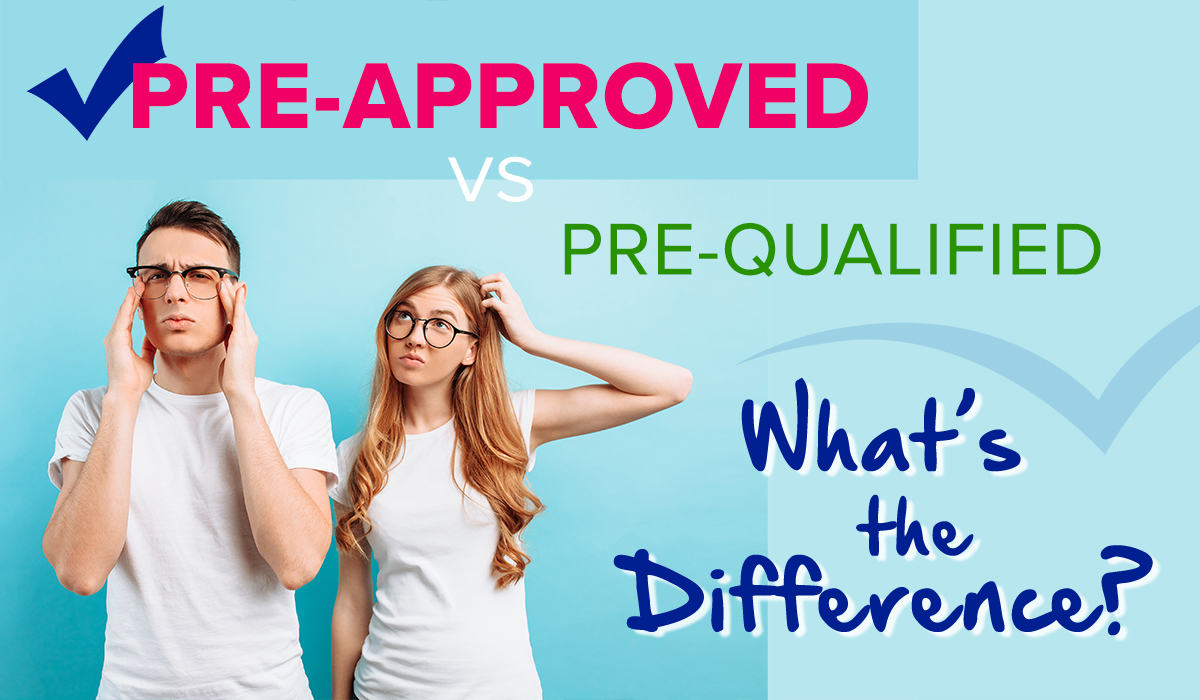If you've decided it's the right time to buy a home, you've probably started paying attention to all the mortgage terminology you blissfully ignored up to now.
Before you get bogged down or confused, we're going to explain two common terms people run into at the beginning of their mortgage journey: Pre-Qualified and Pre-Approved.
To many people, they sound like two names for the same thing.
But they're different in significant ways. Going through the pre-qualification process is like getting advice from an expert based solely on the information you give them.
And a pre-approval?
Well, that's where you give the expert your information but, before giving you feedback, they independently verify everything you've given them. We still think you need to know a little more than that, so read on as we break both terms down in detail.
Why Do I Need To Be Pre-Qualified
As you start thinking (and wondering) about the possibility of buying what may be your first home, it might seem overwhelming. So many questions are running through your head. "Do I make enough money?" "Are my bills too high?" "Could I qualify for enough to buy a home in my area?"
There's only one way to get some answers, and clarity, about how far-fetched (or more likely not) your home ownership dreams are. You need to meet with a mortgage loan officer.
The first time you meet, plan on bringing exact details (and documentation) to show the loan officer how much income you currently earn. Also, take documents to show how much you've made for the last two years. Think pay stub, W-2's, or tax returns.
Now think about your savings or any other assets you can use for the down payment and closing costs. You can calculate the amount and relay the information to the loan officer or bring actual account statements with you to the meeting.
You also need to show the loan officer how much rent you pay, your car payment, student loan payments, and credit card payments. If you have any other debt, excluding utilities, note those and share the information
When you meet with the loan officer and provide them with your income, savings, and debt information, they'll calculate the approximate mortgage payment you may qualify for. The emphasis is on the word "may" because this is a preliminary consultation.
During your meeting, the loan officer will thoroughly discuss potential and actual issues requiring more attention, problem-solving, or planning. At the end of the session, you'll know a lot more about what it takes to be approved for a mortgage.
Time for a Credit Report?
It's unnecessary to have your credit report pulled during the pre-qualification process; however, many lenders have concrete policies requiring it. Once you have your credit pulled for a mortgage, it's going to show up as a credit inquiry on your credit report.
An inquiry on your credit report won't concern a lender. You'll be required to write an explanation for the inquiry so the lender can confirm you're not applying for new revolving or installment debt. A simple statement such as "applying for this mortgage loan; proceeded with a different lender" is adequate.
The benefit to having your credit pulled during pre-qualification is you'll know your actual credit score. Your score affects the interest rate you may get once you have a property in contract. The full report can also reveal any issues in your credit history that need attention.
The sooner you have this information, the better, especially if there are any surprises on the report. Once you fall in love with a home, unexpected credit issues are a dream killer. They take time to address, so discovering them early in the process is the best strategy.
Why Bother with a Pre-Approval?
Once you've gone through a pre-qualification and your credit is pulled, you'll know if there's anything you need to address before making an offer for a home. You'll also understand the income and savings requirements.
And, you'll have a pretty good idea of how much home you can afford. But it doesn't put you in a position to start looking and making offers to purchase a home.
Only pre-approved buyers are welcomed with open arms by sellers and their real estate agents. The worse thing that can happen is to find the exact home you've dreamed about and watching someone else purchase it.
Sellers usually have more than one offer to choose from, and they'll take the best one that has the highest probability of closing. A potential buyer with a pre-approval letter from a bank is a safer bet for the seller, even if they offer a little bit less.
The Pre-Approval Difference
So how is a pre-approval different than a pre-qualification?
There are two parts to a mortgage approval: first, as the borrower, you must be approved. At the same time, the home you'd like to buy and offer as security for the loan must also be approved. A pre-approval takes care of the first half of the process - approving you.
The loan officer takes all the information you've provided, requests further documentation if needed, and prepares your loan file. The lender then verifies all the information. Your credit report becomes part of the loan file, and whatever credit score you have at the time will be used.
Once the lender is satisfied, they provide a letter of pre-approval with your pre-approved loan amount. Now you can freely look for a home and make a formal offer that includes the pre-approval letter.
Having a pre-approval letter makes you competitive with all the other buyers looking for a home. Sellers will view you as a serious buyer who's already done the work to determine if they can get a mortgage to buy the house.
Final Things to Consider
What happens after your offer's accepted on your dream home? The next steps include updating your financial information with current documents. The loan officer tries to anticipate any questions or concerns an underwriter may have when reviewing it.
Next, the home is appraised, and the appraisal is added to the loan file. You and the home must both be approved before the loan can move forward.
It's important to note that you can skip pre-qualification entirely and go straight to the pre-approval process. If you're confident in your financial and credit situation, you may not need to have a pre-qualification consultation.
At Point Equity, we feel a brief meeting with your loan officer helps determine your best path. It's worthwhile to take your time and get the information you need before deciding on your next step to homeownership.








